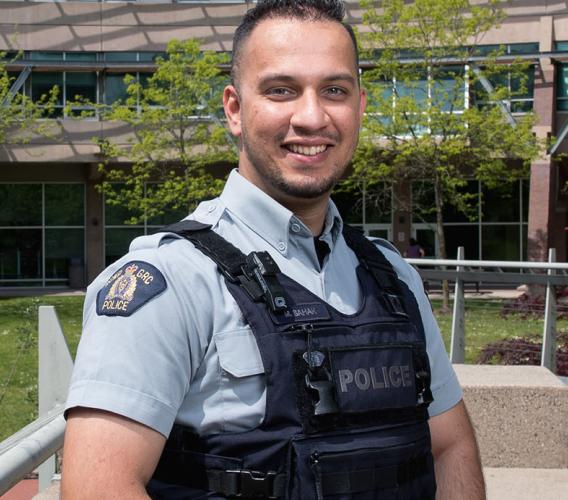Make a difference by keeping communities safe.
Career Overview
Policing is a demanding and challenging job. Police officers perform service based on preserving the peace, protecting life and property, preventing crime, apprehending offenders, and enforcing the laws.
As you can imagine, these responsibilities mean that every day is different. Police may spend much of their time patrolling to prevent crime before it occurs. They may also be busy attending scenes of major crimes, responding to hold-up alarms, arresting criminals, consoling victims of traumatic events, operating police vehicles in emergencies, keeping order at major events, enforcing traffic laws, giving evidence in court, and more.
In Canada, there are police departments at the municipal, provincial and federal levels. In B.C., there are 12 municipal police departments including the regional Transit Police, one First Nations police service, and the Royal Canadian Mounted Police (RCMP) “E” Division providing municipal, provincial and federal policing services to communities across BC.
Law enforcement in Canada also includes careers in a wide range of other agencies and departments at the provincial, national and international levels. This includes careers as border service agents, intelligence officers, cybersecurity analysts, and other public safety careers.
Career Prospects
More than 10,000 police officers are serving throughout BC and police departments are actively recruiting to replace the significant number of officers retiring over the next decade.
More than 70% of the career opportunities for new officers will be due to the retirement of current staff. The remaining job opportunities will come from growth in the police service in B.C. due to increased police services due to population growth in the province. For career outlook information for police officers, visit the WorkBC Explore Careers page.
All job applications to police departments are made to each individual agency, whether a municipal police department or the RCMP.
Personal Qualifications
- Be a Canadian citizen or permanent resident
- Be a minimum of 19 years of age when you apply
- Be someone of excellent character with a clean criminal record
- Physically fit and in excellent health
- Meet minimum visual acuity and hearing requirements
- A team player with good interpersonal and communication skills
Minimum Requirements
- A valid Class 5 BC driver’s license
- Certified in First Responder or standard first aid and CPR
- High school graduate with at least one year of post-secondary education
- A minimum level of post-secondary education in any field
- Successfully meet Peace Officer’s Physical Abilities Test (POPAT) requirements
Preferred Qualifications
- Related work experience or volunteer/community service
- Knowledge of a second language or culture
- Completion of a bachelor’s degree in any field of study
Note
Each police department has its own list of personal qualifications and minimum requirements.
PROGRAMS
Explore programs in this area of study


